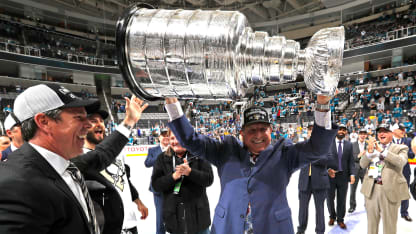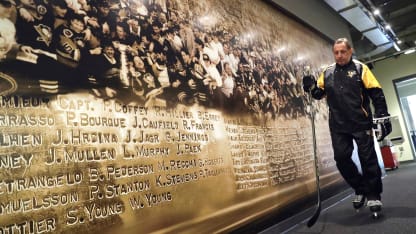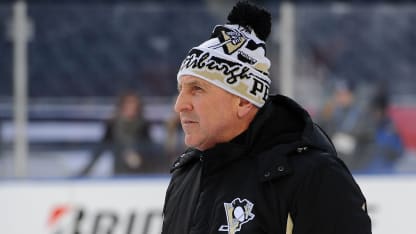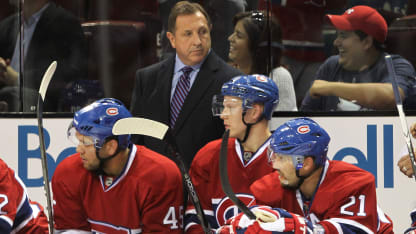MONTREAL -- It took Jacques Martin 30 years as an NHL coach, assistant coach and general manager to finally make it to a Stanley Cup Final. But when he did, he made the most of the trip.
Martin, 63, will have his name engraved into a sterling silver band on the most coveted trophy in professional hockey, the special assistant to Pittsburgh Penguins coach Mike Sullivan having played an influential role in the Cup Final victory against the San Jose Sharks last season.
Jacques Martin's 30-year wait for Stanley Cup ends
Penguins assistant enjoying celebration after long career as NHL coach, executive

© Greg Shamus
It has been a long, sometimes rocky road for Martin, who has worked for seven NHL organizations in a variety of capacities since coaching the Ontario Hockey League's major-junior Guelph Platers to a Memorial Cup championship in 1986.
Proud of the reputation he has cultivated as an educator, Martin has been recognized for his excellence behind an NHL bench, winning the 1998-99 Jack Adams Award as the League's most outstanding coach while with the Ottawa Senators and having been a finalist on three other occasions.
The native of Saint-Pascal-Baylon, Ontario, a speck on the map 30 miles east of Ottawa, signed a two-year contract extension with the Penguins this summer to remain a member of Sullivan's staff.
In a conversation with NHL.com shortly before his Aug. 8 day with the Stanley Cup, the trophy to be displayed at his hockey school on the outskirts of Montreal before heading west to his hometown for public and private celebrations, Martin reflected on his journey, the people he has met, lessons he has learned along the way and more.

© Bruce Bennett/Getty Images
When did it occur to you that you were finally going to win the Stanley Cup, and what was the first thing that went through your mind when you realized it?
"Maybe the last minute of Game 6 (on June 12 in San Jose), when Patric Hornqvist scored into an empty net and clinched it (with 1:02 left in regulation). At that moment, you think about having been a kid growing up in Canada, playing out in the field where you were always broadcasting the game you were playing. You'd see yourself scoring the winning goal for the Stanley Cup or making a key save to win the game, and then the celebration that follows it.
"I felt very fortunate to be able to be part of a great Pittsburgh team, working with some great players - but probably more important, with some great people."
So you won your first Stanley Cup in your first trip to the Final. You were an overnight success, even if it took you 30 years of overnights…
"Somebody is doing a documentary on the Platers, 30 years after I coached them to the Memorial Cup. I was telling the filmmakers that it was a much easier road to winning that title, in my first year in Guelph, than it was winning my first Stanley Cup.
"Sometimes we take winning for granted. When the 2009 Penguins won the Stanley Cup with a lot of young players, they probably felt, "We'll be back there next year." But it's such a difficult trophy to win. It's a two-month marathon. You have to not only be good, you have to be very strong mentally and at times you need to have luck on your side, as well. The commitment of our players and the confidence level this season was a tremendous story."
Does having been in the NHL for 30 years make winning the Stanley Cup now that much sweeter?
"For sure. It's always a goal to win the Stanley Cup. I've always been very appreciative of the opportunities I've had to be able to work in the NHL, and with so many tremendous organizations and to be able to learn from the different people I've worked with.
"In Pittsburgh this year, we had a great working relationship with all the coaches and management. It was a very close-knit group, and we all brought different dimensions. That really helped us in our success. A lot of times, you learn through adversity and through defeat. I've had my share of that in the playoffs. To be able to win it all was definitely something I'll remember the rest of my life."
Have you imagined yet what it will be like to see your name actually on the Stanley Cup, when the names are tapped into it before the start of next season?
"Not really, no. I'm just trying to focus on having the Cup on Monday and enjoying it with friends -- bringing it to my hockey school to the kids who have been there this summer so they can get their picture with it, maybe have the opportunity to experience something they haven't been able to before."
Some say that when you finally lift the 36-pound Stanley Cup, it feels like it weighs a ton. Others say it's as light as feather. How was it for you?

© Brian Babineau/Getty Images
"It was heavy. It was such a proud moment to be able to touch the Cup and lift it. It reminds you that you're part of a team that has achieved success. To be part of that, well, that's your reward."
Do you have a favorite name or team on the Cup? What will catch your eye when you spend the day with it?
"Al Arbour (a seven-time Cup winner, three as a player, four as coach of the New York Islanders) was a mentor for me when I started my coaching career. I always admired how Al brought the best out of his teams and had the success he had. Another is Mike Keenan, a close friend I had an opportunity to work with. Mike was able to win it with the New York Rangers. Those are names I'm anxious to see."
And then there's Scotty Bowman, who won nine Stanley Cups as a coach and five more in management.
"Scotty's ability to deal with people and evaluate situations … he's an icon in the coaching fraternity. For sure, he had some good teams but a lot of times coaches have had good teams and haven't won. It's amazing what Scotty was able to accomplish. Look back at some of the success that the old Canadiens had -- Henri Richard (11 Cup titles), Jean Béliveau and Yvan Cournoyer (10 each). Those players in those eras, the number of Cups they won - it's really amazing the success that they had."
You were an assistant coach under Marc Crawford with the Colorado Avalanche in 1995-96 when you left in January to become coach of the Ottawa Senators. The Avalanche won the Stanley Cup a few months later. The Senators went as far as Game 7 in the 2003 Eastern Conference Final before falling against the New Jersey Devils, and you went five games into the Eastern final in 2010 with the Montreal Canadiens before being eliminated by the Philadelphia Flyers. Did you ever think that, no matter how long you were in this game, you might not win the Stanley Cup?
"I don't think that ever entered my mind. I felt in my later years in Ottawa that we had a team that could win a Cup. We had great team chemistry and some great talent, but unfortunately we weren't able to get past New Jersey in 2003. That was probably the closest I'd get with a team before this season. My first year in Montreal (2009-10), we went to the Eastern Conference Final … but I don't think at that point we were that strong. We were starting to build a team and we had suffered some key injuries and we just didn't have the depth.
"But this year in Pittsburgh, I really liked our team. Even if from the outside people would question our defense, we had a team with tremendous depth. We could play four lines and be comfortable and confident that all the guys would do the job."

© Bruce Bennett
How about having given any thought to winning the Stanley Cup as a player, from your days playing goal for New York's St. Lawrence University in the early 1970s?
"Yes, I envisioned winning the Cup as a kid and even in college. That's always a dream, especially as a youngster growing up in Canada, coming from where I do, not far from Montreal. I was very much born in a hockey environment. My brother, Ronald, played, and he was a good example for me.
"But I realized as I grew up, at the end of my university days, that I wasn't good enough as a player. That's when I turned my focus to coaching. Winning the Stanley Cup is about the commitment that you have to make to win it. The price you have to pay, the sacrifice. That's not to take anything away from not winning a Cup because there have been some great players and coaches who never won it. I can think of a fellow coach, the late Roger Neilson, who I had a great deal of respect for and learned tremendously from. Roger never had the opportunity to win one. I never judge people for winning or not winning, but I can say that it's great to be part of a winner."
In a 2009 Canadiens Magazine profile, upon being hired by Montreal, you were quoted as saying, "My patience is probably my biggest asset." Thirty years in the NHL and now a Stanley Cup winner, would you say that still holds true?
"I think so. What was great this year, working with Mike Sullivan, was that all those years of experience I had, meant I could bring a different dimension to his staff. With experience, you can deal with players who arrive by trade and may need longer to adjust to a new system, new staff and new teammates, with a new family life and so on. Having been around for a lot of years and done a lot of different jobs, whether as assistant coach, head coach or manager, you learn from every experience. That helps the process and it helps to build a winning team."

















